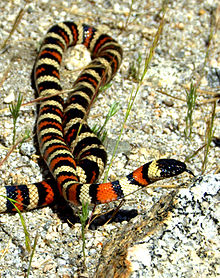California mountain kingsnake
| California mountain kingsnake | |
|---|---|

| |
| Lampropeltis zonata multicincta | |
| Scientific classification | |
| Domain: | Eukaryota |
| Kingdom: | Animalia |
| Phylum: | Chordata |
| Class: | Reptilia |
| Order: | Squamata |
| Suborder: | Serpentes |
| Family: | Colubridae |
| Genus: | Lampropeltis |
| Species: | L. zonata
|
| Binomial name | |
| Lampropeltis zonata | |
| Synonyms | |
The California mountain kingsnake (Lampropeltis zonata) is a species of nonvenomous colubrid snake that is endemic to North America. It is a coral snake mimic, having a similar pattern consisting of red, black, and yellow on its body, but the snake is completely harmless. Seven subspecies are recognized, with five found in the U.S., including the nominotypical subspecies, and two in Mexico.[1]
Geographic range
[edit]The California mountain kingsnake is endemic to western North America. It ranges from extreme southern Washington state, where it has a disjunct population, through Oregon and California, to northern Baja California. The majority of its range lies within the state of California, which is the reason for its common name.
Description
[edit]California mountain kingsnakes have a banded pattern that consists of red, black, and white crossbands. The bands are always arranged in the same order with each red crossband being surrounded by two black crossbands, forming what is called a triad. Each triad is separated from the next triad by a white crossband, or in some examples by a cream or yellow crossband. Some individuals may have reduced amounts of red pigment, and rare individuals may have virtually no red bands at all. One population from Isla Todos Santos always lacks the red crossbands and is instead uniformly banded with black and white, similar in appearance to the related California kingsnake.
Habitat
[edit]As its common name suggests, the California mountain kingsnake is found mostly in the mountains within its geographic range.
Subspecies
[edit]The following subspecies are recognized:
- Lampropeltis zonata multicincta (Yarrow, 1882)
- Lampropeltis zonata multifasciata (Bocourt, 1886)
- Lampropeltis zonata parvirubra Zweifel, 1952
- Lampropeltis zonata pulchra Zweifel, 1952
- Lampropeltis zonata zonata (Lockington, 1876 ex Blainville, 1835)[1]
- Lampropeltis zonata agalma (Van Denburgh & Slevin, 1923)
- Lampropeltis zonata herrerae (Van Denburgh & Slevin, 1923)
References
[edit]- ^ a b c Integrated Taxonomic Information System (ITIS). www.itis.gov.
- ^ Boulenger, G.A. 1894. Catalogue of the Snakes in the British Museum (Natural History). Volume II., Containing the Conclusion of the Colubridæ Aglyphæ. Trustees of the British Museum (Natural History). (Taylor and Francis, Printers.) xi + 382 pp. + Plates I.- XX. (Coronella zonata, p. 202-203.)
- ^ The Reptile Database. www.reptile-database.org.

